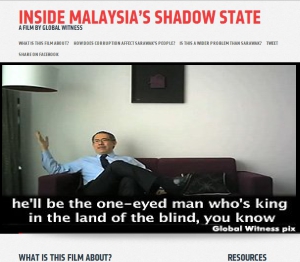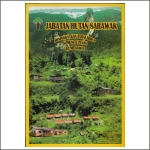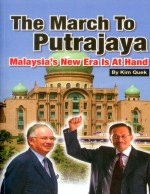By Liumx
 Ever wonder why Identity cards (ICs) and Birth Certificates are such difficult prizes to obtain for our rural poor? Follow us on a trip to Kafka’s Castle in Putrajaya.
Ever wonder why Identity cards (ICs) and Birth Certificates are such difficult prizes to obtain for our rural poor? Follow us on a trip to Kafka’s Castle in Putrajaya.
Four delegates of MEO-Net, Ong BK, Molly Cheah, Liew TC and Liew MS, visited the National Registration Department (Jabatan Pendaftaran Negara or JPN) in Putrajaya on February 12, to meet with the Deputy Director-General (Operations) or Timbalan Ketua Pengarah (Operasi) Haji Zulkifli bin Rahmat.
Encik Zulkifli is responsible for ICs for Sabah & Sarawak. The delegation also met with Encik Rahman, another JPN official, and Public Relations Officer Puan Jainisah binti Mohd Noor.
According to Encik Zulkifli, there are issues of “illegal” longhouses, due to those longhouses that have split off from existing longhouses, hence illegal village chiefs or Tuai Rumah. These cause problems of recognition by the State. These so-called illegal Tuai Rumahs are not empowered to verify identity – a crucial step in obtaining many JPN documents.
Encik Zulkifli also cited the people “crossing borders”, as one reason for the problems of granting ICs and Birth Certificates. The JPN says it cannot determine whether these people who live near international borders are “true citizens”. Puan Jainisah said the burden of proof of citizenship lies with the applicants.
He further emphasised that while there are three major steps before a successful registration – apply, process, and approve – those who apply may not get the approval along the way.
Zulkifli said there are about 15,000 Penans of which about 10,000 are registered with JPN.
 Jainisah stressed that those cases in the press reports are “late registrations” (“pendaftaran lewat”). Applications made more than14 days after a birth, for example, are referred to as delayed (“lambat”) and after 42 days, they become late (“lewat”).
Jainisah stressed that those cases in the press reports are “late registrations” (“pendaftaran lewat”). Applications made more than14 days after a birth, for example, are referred to as delayed (“lambat”) and after 42 days, they become late (“lewat”).
According to the JPN, previously, the mobile units focused mainly on new registrations instead of delayed or late registrations.
Dr Molly spoke as a medical personnel that doctors and nurses can give physical evidence for newborns within 42 days of delivery. However Zulkifli said some medical personnel refused to certify, and hence created obstacles for the children’s registration.
JPN also cited the case of a baby’s father being Malaysian and mother a foreigner, as one example of “problematic verification”. This was in response from queries that some newborns in government clinics are not issued birth certificates.
As a rule, according to the JPN, as long as a mother is a Malaysian citizen, the child is considered a Malaysian and should be given a birth certificate, even if there is missing information about both parents for example, an absent father.
Ong gave the example of another problem: a Tuai Rumah without an IC himself or herself. JPN seems able to do little in such an instance. While there were cases when some people obtained their IC without a Birth Certificate, Jainisah mentioned that in the past, statutory declarations could serve as a means of proof, but they are no longer accepted due to the possibility of fraud.
JPN said it allowed “special powers” to the state governments in Sabah and Sarawak to handle their registrations in their own ways.
Zulkifli gave an example of a source of difficulty: if a newborn is given a “sijil kelahiran bukan warganegara” (non-citizen’s birth certificate), this may cause the baby to face future complications, if the baby is proved to be born in Malaysia.
JPN said they will train their staff for better communication skills, but do not promise that this can solve the problems of misunderstanding in communication and different interpretations of laws. This is in response to queries that some officers in district JPN offices seem to make their own interpretations of the laws. Three examples were given by Ong regarding Long Lama and Selangau JPN officers.
Ong gave the example of R. who was alleged by many applicants to have collected money and gave no receipts to applicants. JPN said this is a very serious criminal offence. They asked the people concerned to lodge a police report. However, JPN acknowledged that the rural people may not trust the police either.
 Applicants often engage in guessing games on which are the required compulsory documents (dokumen wajib) and those which are supporting documents required for late application of birth certificate. The truth is: out of 16 types of documents only 5 are compulsory. JPN said they will do something to clarify this with applicants.
Applicants often engage in guessing games on which are the required compulsory documents (dokumen wajib) and those which are supporting documents required for late application of birth certificate. The truth is: out of 16 types of documents only 5 are compulsory. JPN said they will do something to clarify this with applicants.
Another, even worse, guessing game is when the applicants are not told what has stalled their applications. JPN has mentioned that they need not inform applicants on reasons of rejection of applications. However this may keep genuine applicants in the dark for extended periods, and deny them their citizens’ rights. JPN agreed to look into changing this practice.
Dr Molly suggested that there should be two copies of application forms: one at state level, and one to be given to the JPN Putrajaya to audit the state registration process.
 On the mobile units, JPN said they had created a special project for Sarawak where there is a two-year deadline for completing registration of all the 66,000 unregistered people.
On the mobile units, JPN said they had created a special project for Sarawak where there is a two-year deadline for completing registration of all the 66,000 unregistered people.
JPN agreed to look into possibility of uploading the registration rate through the mobile units onto its website, to enable public monitoring on whether it is realistic to aim to finish all registrations by the two-year deadline. JPN admit that the current rate of registration (5126 in three years as disclosed by their Director-General) is too slow. Much of the future progress depends on expanding the mobile units. The JPN have asked for a special fund to expand the mobile units, but there has been no approval yet.
At first the JPN were reluctant to give the schedule and venues for the mobile unit visits based on “security grounds”. But after discussion, they agreed to ask their Director-General to disseminate this information more widely if possible, in view of the failure of the mobile units to announce their arrival to the residents of the interior.
In reply to a request that NGOs be allowed to participate in the mobile units, the JPN asked for an application from NGOs to facilitate their issuance of a letter of support.
As a potential solution to the poor information available to rural communities on mobile unit visits, it was suggested the JPN should inform the Resident’s Office (Pejabat Residen) and Tuai Rumah of the time and place of their visits. Failing this would mean a breach of their SOP (Standard Operating Procedure), for which they can take disciplinary action.
JPN said the gazetted application forms for various documents cannot be simplified, otherwise the extra supporting information may not be given. The NGO representatives mentioned that even JPN officers might find it difficult to fill in the very complex forms!
JPN gave an example of an improved practice, to replace the family photo, by using the BMK (Borang Maklumat Keluarga), where the family need not be together in the same photo. This was in response to complaints by many families who face problems to gather all family members for a photo required for the late applications of birth certificates and ICs.
Encik Rahman asked what the NGOs can do to help with the registration. Ong replied that NGOs can provide volunteers to help announce the visits of mobile units to long houses through their networks, and also to help identifying problems in filling up the application forms and collecting support documents.
On the issue of using an applicant’s name for checking and reviewing the application status Puan Jainisah said they may add a coding for these kind of late registrations to enable tracking of the application status.
Currently the JPN insists that the applicants bring the receipt of their application before they can check on the status of the application. However, an extended wait by an applicant may often cause the receipt to be damaged or lost.
Technically it is possible to use the applicant’s name to search for the progress of an application in the computer system, and JPN will look into this.
JPN also asking for uploading of data collected by NGOs to a website for quick referencing by JPN to facilitate quicker registration. Password protection may be needed for access to such information. Ong told them that the NGOs are currently working on such a website.
There is an example of fraudulent information in the application forms: some missing parents are substituted with some other relatives in the application forms. JPN said that people must be cautious of this and must not let it happen.
Ong summarized the conclusions as below:
1. The NGOs called on JPN to review all the existing application cases at various JPN offices, and also the 300+ cases identified in our 3 reports so far ;
2. JPN to keep NGOs informed of the schedule of Mobile Units so NGOs can help in dissemination of this information;
3. NGO will upload information collected onto a website;
4. An approval letter will be sought from JPN to show that the JPN Putrajaya is supporting the NGO participation in mobile unit missions.






















[…] “true citizens”. JPN public relations officer Jainisah Mohd Noor told NGO members that the burden of proof of citizenship rests with the […]
Pingback by Malaysia’s invisible identity crisis « Hornbill Unleashed — March 25, 2010 @ 12:00 AM |
Let the new Sarawak government led by Baru Bian issue Sarawak ICs. We don’t have to rely on JPN issued ICs within Sarawak.
Comment by Peen Keening — February 23, 2010 @ 9:42 PM |
Would you like to tell us more about what a “country” or “state” is Nirman? And what is “caring” for a “country” ?
Comment by Watcha — February 23, 2010 @ 7:26 PM |
I’ve been to JPN Putrajaya on at least 7 occassions. It always amazes me at how there are always a big presence of Indonesians on the 1st floor. Perhaps the ease at which they get citizenship is a big attraction.
My observation over the years tells me that Indonesians get better deal than Sarawak natives.
Comment by Peen Keening — February 22, 2010 @ 8:18 AM |
yes….. Indonesian get better deal natives or sarawakian…..
For example 1…..I am considered non bumi because my great grand father is a chinese….married to org ulu….so my father is chinese…… married to org ulu as well…… and 3rd chinese…married to org ulu!!!!!! and kid now still considered non bumi!!!!
BUT………….and someone purely Indonesian or someone who…..who be granted citizenship….become Malaysian been consider bumiputra!!!!!
For example 2 …… the Bugis in ladang 3….how can they be considered bumi??? They pure Indon….
For example 3 ……. probably 1/2 ob Long Bangga were from Indonesia……now granted Malaysian citizenship!!!!!
So why cant my late father, my kids and my myself be considered bumi???? Is a migrant has more right then a local born???
Comment by kick ass... — May 12, 2010 @ 9:36 PM |
Daytime….Sabah is rule by Msian/Sabahan…… but at nite Sabah is rule by Indonesian/Filipinos!
So is this what Sabahan want????
Next be Sarawak……. Marudi and Long Lama is flood with illegal Indonesian…..Oil Palm estate….. Logging companies….. so our Police force and Immigration tidur ka!!!!!
Comment by flyer — May 12, 2010 @ 9:44 PM |
correction…..”flooded”
Comment by flyer — May 12, 2010 @ 9:45 PM |
There are a lot of misunderstand and I don’t know whose fault it is. When the government is too kind, the people will step on their head. Some even lied and brought outsider (e.g. Indonesian) to apply for IC and birth certs. This cannot be tolerated. The national security is the top priority. Do you know that some of the rural people in Sabah and Sarawak doesn’t even know how to sing “Negaraku”? This is making the job more difficult for the JPN officer in Sabah and Sarawak.
Comment by Nirman — February 21, 2010 @ 7:09 PM |
There is no such thing as being “kind” in the affairs of the State involving millions of people!
This thinking is FEUDAL! Of course, many, though not absolutely all, think that this is a personal matter – just like old pirate sultans of ancient days! Is it any surprise, we have a constitutional lawyer now a Head of State thinking in personal terms?
If they rakyat do not know how to sing Negaraku, ain’t that very telling of what THE GOVERNMENT of Malaysia or its so-called PUBLIC SERVANTS really are? :((
Comment by Watcha — February 22, 2010 @ 6:43 PM |
When the rakyat don’t care about the country and not even want to learn to sing Negaraku it is not other people fault.
Comment by Nirman — February 22, 2010 @ 10:21 PM |
They (JPN)actually KNOW the parents?!
JPN excuses are better than their efforts at doing their job!
Comment by Watcha — February 20, 2010 @ 2:36 PM |
The records of the parents, grand parents, sons, grand children and others are available in the NRD’s database. Don’t ever try to lie by substituting parents information with other person. This is a serious matter.
Comment by Nirman — February 22, 2010 @ 10:24 PM |
NRD’s database is a dustbin base! What other Filipinos, Bangladeshis, Indonesians, or Russian girls, Chinese masseurs etc,, illegals are in there?
If the gomen can screw the Judges what are dumb NRD people? :((
Comment by Watcha — February 23, 2010 @ 7:18 PM |
your ngo’s efforts and initiative to make JPN accountable for their work in Sabah and S’wak is laudable more so your engagement with the department.. keep it up!
Comment by cj — February 20, 2010 @ 11:37 AM |